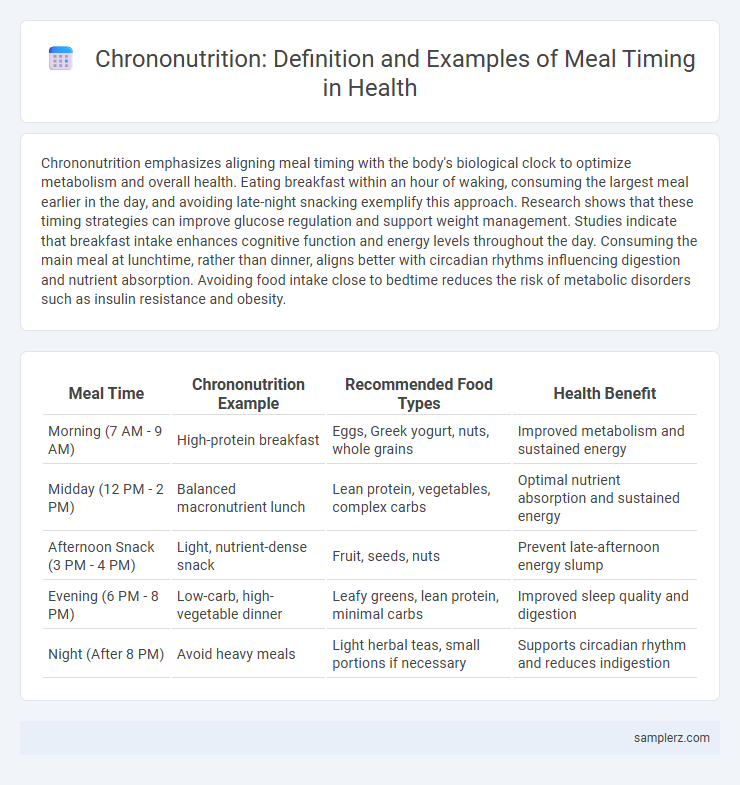Chrononutrition emphasizes aligning meal timing with the body's biological clock to optimize metabolism and overall health. Eating breakfast within an hour of waking, consuming the largest meal earlier in the day, and avoiding late-night snacking exemplify this approach. Research shows that these timing strategies can improve glucose regulation and support weight management. Studies indicate that breakfast intake enhances cognitive function and energy levels throughout the day. Consuming the main meal at lunchtime, rather than dinner, aligns better with circadian rhythms influencing digestion and nutrient absorption. Avoiding food intake close to bedtime reduces the risk of metabolic disorders such as insulin resistance and obesity.
Table of Comparison
| Meal Time | Chrononutrition Example | Recommended Food Types | Health Benefit |
|---|---|---|---|
| Morning (7 AM - 9 AM) | High-protein breakfast | Eggs, Greek yogurt, nuts, whole grains | Improved metabolism and sustained energy |
| Midday (12 PM - 2 PM) | Balanced macronutrient lunch | Lean protein, vegetables, complex carbs | Optimal nutrient absorption and sustained energy |
| Afternoon Snack (3 PM - 4 PM) | Light, nutrient-dense snack | Fruit, seeds, nuts | Prevent late-afternoon energy slump |
| Evening (6 PM - 8 PM) | Low-carb, high-vegetable dinner | Leafy greens, lean protein, minimal carbs | Improved sleep quality and digestion |
| Night (After 8 PM) | Avoid heavy meals | Light herbal teas, small portions if necessary | Supports circadian rhythm and reduces indigestion |
Understanding Chrononutrition: The Science of Meal Timing
Chrononutrition explores how meal timing influences metabolism, hormonal regulation, and overall health by aligning food intake with the body's natural circadian rhythms. Eating breakfast within two hours of waking boosts energy levels and cognitive function, while consuming the largest meal earlier in the day supports optimal glucose regulation and weight management. Nighttime eating disrupts melatonin production, increasing the risk of metabolic disorders such as insulin resistance and obesity.
Chrononutrition and Its Impact on Metabolic Health
Chrononutrition emphasizes aligning meal timing with the body's circadian rhythms to optimize metabolic health, such as consuming a high-protein breakfast to enhance insulin sensitivity and energy expenditure. Studies show that eating larger meals earlier in the day, rather than late at night, can reduce the risk of type 2 diabetes and obesity by improving glucose metabolism and lipid profiles. Time-restricted feeding, a form of chrononutrition, has demonstrated benefits in regulating circadian clock genes and enhancing overall metabolic function.
Breakfast Timing: Early Morning Meals for Optimal Energy
Consuming breakfast between 6:00 AM and 8:00 AM aligns with the body's circadian rhythm, enhancing metabolic efficiency and energy utilization throughout the day. Studies indicate that early morning meals rich in complex carbohydrates and proteins support stable blood glucose levels and cognitive function. Chrononutrition research emphasizes that optimal breakfast timing can reduce the risk of metabolic disorders by synchronizing nutrient intake with hormonal fluctuations.
Lunch Timing: Midday Meals to Sustain Alertness
Consuming lunch between 12:00 PM and 1:30 PM aligns with the body's circadian rhythms, promoting optimal digestion and sustained alertness through the afternoon. Including balanced macronutrients such as lean protein, complex carbohydrates, and healthy fats supports stable blood sugar levels and enhances cognitive function. This timing reduces post-meal energy crashes and improves overall productivity during peak midday hours.
Dinner Timing: Early Evenings for Better Digestion
Dinner timing in chrononutrition emphasizes consuming meals in the early evening, typically between 6 PM and 7 PM, to align with the body's natural circadian rhythms. Eating earlier supports optimal digestion by allowing the gastrointestinal system to function efficiently before nighttime fasting. Studies show that early dinner timing reduces the risk of acid reflux and improves metabolic health by enhancing glucose regulation during sleep.
Skipping Late-Night Meals: Effects on Sleep and Weight
Skipping late-night meals aligns with the principles of chrononutrition by supporting the body's natural circadian rhythms. Studies reveal that avoiding food intake close to bedtime improves sleep quality by reducing metabolic stress and promoting hormonal balance. This practice also contributes to weight management by minimizing calorie consumption during periods of low energy expenditure.
Time-Restricted Eating: Aligning Meals with the Body Clock
Time-Restricted Eating (TRE) involves consuming all daily calories within a specific window, typically 8-12 hours, to synchronize with the body's circadian rhythm. Research shows that aligning meal timing with natural biological clocks enhances metabolic health, improves insulin sensitivity, and promotes weight management. TRE supports optimal digestion and energy utilization by restricting food intake to daylight hours when the body is most efficient at processing nutrients.
Chrononutrition in Shift Work: Managing Unusual Meal Times
Chrononutrition in shift work emphasizes aligning meal timing with the body's circadian rhythm despite irregular schedules to optimize metabolic health. Consuming balanced meals during night shifts, particularly high-protein and low-glycemic foods, helps maintain energy levels and reduces the risk of metabolic disorders. Strategic meal planning, such as smaller, nutrient-dense snacks timed to circadian peaks, supports digestive efficiency and circadian hormone regulation in shift workers.
Chrononutrition and Fasting: Benefits of Aligned Eating Windows
Chrononutrition emphasizes aligning meal timing with the body's circadian rhythms to optimize metabolism and overall health. Eating windows synchronized with natural biological clocks improve digestion, enhance nutrient absorption, and support weight management. Time-restricted fasting, a key component, reduces inflammation and regulates insulin sensitivity, promoting long-term metabolic benefits.
Practical Meal Timing Tips for Chrononutrition Success
Eating protein-rich foods like eggs or Greek yogurt at breakfast supports muscle synthesis and metabolic regulation in line with circadian rhythms. Scheduling carbohydrate intake for lunch enhances energy availability during peak activity hours, improving cognitive function and digestion efficiency. Consuming lighter meals with healthy fats, such as avocado or nuts, in the evening aligns with the body's reduced metabolic rate, promoting better sleep and nutrient absorption.

example of chrononutrition in meal timing Infographic
 samplerz.com
samplerz.com